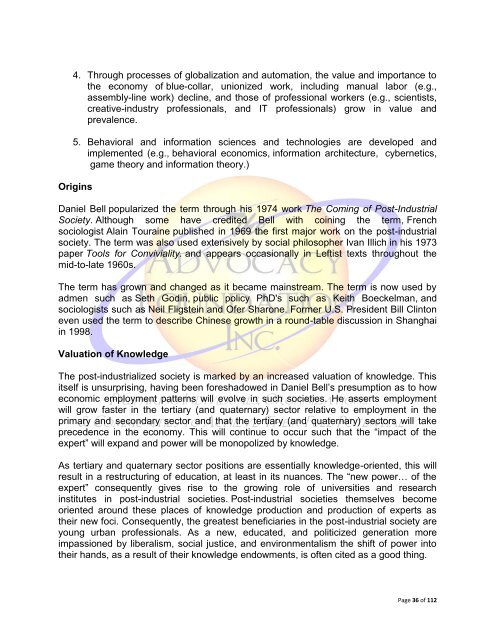De-Industrialization
De-Industrialization
De-Industrialization
Create successful ePaper yourself
Turn your PDF publications into a flip-book with our unique Google optimized e-Paper software.
4. Through processes of globalization and automation, the value and importance to<br />
the economy of blue-collar, unionized work, including manual labor (e.g.,<br />
assembly-line work) decline, and those of professional workers (e.g., scientists,<br />
creative-industry professionals, and IT professionals) grow in value and<br />
prevalence.<br />
5. Behavioral and information sciences and technologies are developed and<br />
implemented (e.g., behavioral economics, information architecture, cybernetics,<br />
game theory and information theory.)<br />
Origins<br />
Daniel Bell popularized the term through his 1974 work The Coming of Post-Industrial<br />
Society. Although some have credited Bell with coining the term, French<br />
sociologist Alain Touraine published in 1969 the first major work on the post-industrial<br />
society. The term was also used extensively by social philosopher Ivan Illich in his 1973<br />
paper Tools for Conviviality. and appears occasionally in Leftist texts throughout the<br />
mid-to-late 1960s.<br />
The term has grown and changed as it became mainstream. The term is now used by<br />
admen such as Seth Godin, public policy PhD's such as Keith Boeckelman, and<br />
sociologists such as Neil Fligstein and Ofer Sharone. Former U.S. President Bill Clinton<br />
even used the term to describe Chinese growth in a round-table discussion in Shanghai<br />
in 1998.<br />
Valuation of Knowledge<br />
The post-industrialized society is marked by an increased valuation of knowledge. This<br />
itself is unsurprising, having been foreshadowed in Daniel Bell’s presumption as to how<br />
economic employment patterns will evolve in such societies. He asserts employment<br />
will grow faster in the tertiary (and quaternary) sector relative to employment in the<br />
primary and secondary sector and that the tertiary (and quaternary) sectors will take<br />
precedence in the economy. This will continue to occur such that the “impact of the<br />
expert” will expand and power will be monopolized by knowledge.<br />
As tertiary and quaternary sector positions are essentially knowledge-oriented, this will<br />
result in a restructuring of education, at least in its nuances. The “new power… of the<br />
expert” consequently gives rise to the growing role of universities and research<br />
institutes in post-industrial societies. Post-industrial societies themselves become<br />
oriented around these places of knowledge production and production of experts as<br />
their new foci. Consequently, the greatest beneficiaries in the post-industrial society are<br />
young urban professionals. As a new, educated, and politicized generation more<br />
impassioned by liberalism, social justice, and environmentalism the shift of power into<br />
their hands, as a result of their knowledge endowments, is often cited as a good thing.<br />
Page 36 of 112

















